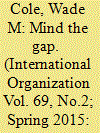| Srl | Item |
| 1 |
ID:
187393


|
|
|
|
|
| Summary/Abstract |
The comparative study of atrocities and atrocity prevention faces several obstacles including a lack of consensus on the universe of cases and too few cases to statistically test alternative theories. The brutality-based (BB) conception is based on the idea that widespread, state-led violations of physical integrity rights constitute an assault on the personhood and human dignity of the members of society— a mass atrocity. Applying this idea to all countries annually systematically identifies a larger number of atrocities and facilitates categorization into three levels of intensity. The BB methodology for generating annual atrocity lists is replicable and transparent. The findings show that, between 1981 and 2019, the frequency of atrocities as defined and identified by other projects has been decreasing, but BB atrocities have been increasing. The sequence of different types of widespread physical integrity violations suggests new avenues for research on atrocity occurrence, escalation, de-escalation, and cessation.
|
|
|
|
|
|
|
|
|
|
|
|
|
|
|
|
| 2 |
ID:
139801


|
|
|
|
|
| Summary/Abstract |
According to recent studies, international human rights treaties are ineffective, counterproductive, or else beneficial for only those countries that tend to respect human rights regardless of treaty membership. Analysts often attribute gaps between human rights principles and practices to willful disobedience, self-interested defection, and ineffective enforcement. Using two-stage regression models to analyze compliance with the International Covenant on Civil and Political Rights, I examine whether countries' inability (as opposed to unwillingness) to implement treaty terms is also responsible for the gap between commitment and compliance. I find that one dimension of state capacity in particular—bureaucratic efficacy—enhances levels of compliance with civil, political, and physical integrity rights provisions. These findings lend credence to an important aspect of the managerial approach—that noncompliance is often inadvertent and conditioned by a state's ability to implement treaty terms.
|
|
|
|
|
|
|
|
|
|
|
|
|
|
|
|